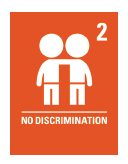This week our ‘Right of the Week’ is Article 17
Children have the right to get information from the Internet, radio, television, newspapers, books and other sources.
Adults should make sure the information they are getting is not harmful.
This week’s ‘Right’ is linked to International Women’s Day on the 23rd of February.
Article 2 – No discrimination
All children have all these rights, no matter who they are, where they live, what language they speak, what their religion is, what they think, what they look like, if they are a boy or girl, if they have a disability, if they are rich or poor, and no matter who their parents or families are or what their parents or families believe or do. No child should be treated unfairly for any reason.

This week our ‘Right of the Week’ is Article 3 .
Article 3 – Best Interests of the Child
When adults make decisions, they should think about how their decisions will affect children. All adults should do what is best for children. Governments should make sure children are protected and looked after by their parents, or by other people when this is needed. Governments should make sure that people and places responsible for looking after children are doing a good job.
It is Scotland Loves Languages Week. Article 30 of the UNCRC states that we have the right to celebrate and learn about languages and customs.
We are also thinking about identity and how we can support others to feel safe and comfortable to be their true selves, whether that’s in our school, community or beyond.
Article 30 – Minority culture, language and religion
Children have the right to use their own language, culture and religion – even if these are not shared by most people in the country where they live.
Article 2 – No discrimination
All children have all these rights, no matter who they are, where they live, what language they speak, what their religion is, what they think, what they look like, if they are a boy or girl, if they have a disability, if they are rich or poor, and no matter who their parents or families are or what their parents or families believe or do. No child should be treated unfairly for any reason.
Article 13 – Sharing thoughts freely
Children have the right to share freely with others what they learn, think and feel, by talking, drawing, writing or in
any other way unless it harms other people.
Article 17 – Access to information
Children have the right to get information from the Internet, radio, television, newspapers, books and other sources. Adults should make sure the information they are getting is not harmful. Governments should encourage the media to share information from lots of different sources, in languages that all children can understand.
This month is ‘National Autism Awareness’ week.
Our Right of the Week this week is Article 23
A child of with a disability has the right to live a full and decent life with dignity and independence, and to play an active part in the community. Governments must do all they can to provide support to disabled children.
In South Sudan, a generation of children with disabilities are locked out of an education and trapped in a cycle of poverty. We would like to help these children achieve their right to an education. We can do so if every family could bring in £1 to support these children on the 1st of April.
Many children with disabilities in South Sudan are not able to go to school or, later on, to work and earn a living. They may have no access to support services or hospitals for treatment. They may face stigma and exclusion.
From the 12 February to 11 May, all public donations to our WEE BOX, BIG CHANGE appeal will be doubled by the UK government.
You can learn even more about our WEE BOX, including how parishes and schools make donations with our handy 2021 WEE BOX guide.